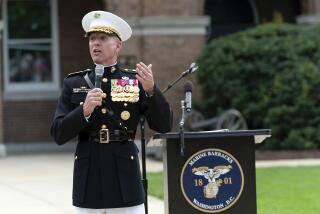U.S. Will Add Iraq Overseer
- Share via
MADRID — Faced with an array of problems that have slowed the effort to restore order in Iraq, the Bush administration plans to appoint a new coordinator to oversee all political and reconstruction issues in the country, according to administration officials.
The White House is expected to name L. Paul Bremer III, a former ambassador and head of the State Department’s counter-terrorism office, to the post, sources said. Bremer would have authority over retired Army Lt. Gen. Jay Garner, who now administers the country.
The administration of the country in the wake of Saddam Hussein’s ouster has been fraught with difficulties, ranging from the breakdown of law and order to the collapse of basic services.
The problems have sparked an anti-American backlash and tensions between U.S. troops and Iraqis that have led to confrontations and deaths.
The job of coordinating Iraq’s reconstruction has proved much more complicated than anticipated, in part because of the massive looting and destruction that followed the fall of Baghdad, U.S. officials say.
The appointment of Bremer, who joined the consulting firm of former boss Henry A. Kissinger after leaving the State Department, was seen as imminent.
Under Bremer, Garner would remain in charge of reconstruction, while Zalmay Khalilzad, the president’s special envoy to Iraq, would oversee the political transition that now centers on forming an interim Iraqi authority.
But U.S. sources speculated that adding a coordinator is also an attempt to rein in the Pentagon, which has dominated policy in Iraq and sparked intense disputes within the administration, sometimes by defying agreements reached by the Bush war council.
“The Pentagon was running wild and there’s been no parental oversight,” said a well-placed U.S. official familiar with the internal friction.
It was unclear whether Bremer would report to the Pentagon, which had no comment on his expected appointment.
In a further bid to restore order in Iraq, Britain has launched talks with more than a dozen nations about forming a multinational force to stabilize the country and train a new police force, according to U.S. and European officials.
After talks in London this week, Britain won commitments from Spain, Italy and Poland to contribute forces to help restore law and order in Iraq, according to U.S., Spanish and British officials.
At a news conference in Madrid with Secretary of State Colin L. Powell, Spanish Foreign Minister Ana Palacio said Thursday that Spain was willing to participate. Spanish defense officials said Madrid was prepared to deploy 500 military police officers and 125 Civil Guard troops, who played similar postwar roles in the volatile Balkans region in the 1990s.
Polish defense officials said this week they had been asked to provide up to 4,000 troops, while Denmark has reportedly discussed sending 380 troops for the stabilization phase.
Iraq remains far from stabilized. The State Department, National Security Council, CIA and the U.S. Central Command, which ran the war, have become increasingly frustrated with exile leader Ahmad Chalabi and his Free Iraqi Forces, the U.S. sources said. Both are backed by the Pentagon, which favors giving Chalabi a leading role in an interim government.
The Free Iraqi Forces had lately begun setting up roadblocks in defiance of U.S. military orders and even confronted American troops when ordered to take them down. Some of the U.S.-trained forces were also linked with looting, the sources said.
“Centcom decided these guys were becoming a threat to law and order as well as U.S. security,” said an administration official who requested anonymity.
Chalabi, a Shiite Muslim who fled Baghdad in 1958 and returned under Pentagon auspices during the war, has come to symbolize the conflict between the State Department and the Pentagon over how to transform Iraq after Hussein’s demise.
The department advocates allowing new leaders to emerge from within Iraq and, along with former exiles, determine the course to a new Iraqi democracy -- even if it means a messy and uncertain period and that the result has an Islamic tinge.
Powell said Thursday that Iraq could be both democratic and Islamic.
“We see no inconsistency between their faith and the values of democracy that we all hold dear,” he told reporters in Madrid.
But the Pentagon’s political leadership has strongly backed expediting the transition process and allowing the secular opposition figures to play a preeminent role, despite fears that they may be seen as either U.S. puppets or as an imposed government, U.S. and allied sources say.
A White House announcement of a new coordinator comes after months of battles between the State Department and the Pentagon over postwar planning and policy.
Bremer’s credentials bridge the administration divide. The Yale graduate spent 23 years at the State Department, serving in Afghanistan, Malawi, Norway and the Netherlands. He joined a consultancy firm run by former Secretary of State Kissinger in 1989.
Respected by the neoconservatives who crafted Iraq policy and promoted the war, Bremer was appointed chairman of the National Commission on Terrorism in 1999 to review U.S. counter-terrorism policy. The commission reported its findings in 2000.
Last year, Bush appointed him to the President’s Homeland Security Advisory Council. A former managing director of Kissinger Associates, Bremer now heads the Crisis Consulting practice of Marsh Inc., a major risk-assessment firm.
*
Times staff writer Mary Curtius in Washington contributed to this report.
More to Read
Sign up for Essential California
The most important California stories and recommendations in your inbox every morning.
You may occasionally receive promotional content from the Los Angeles Times.













